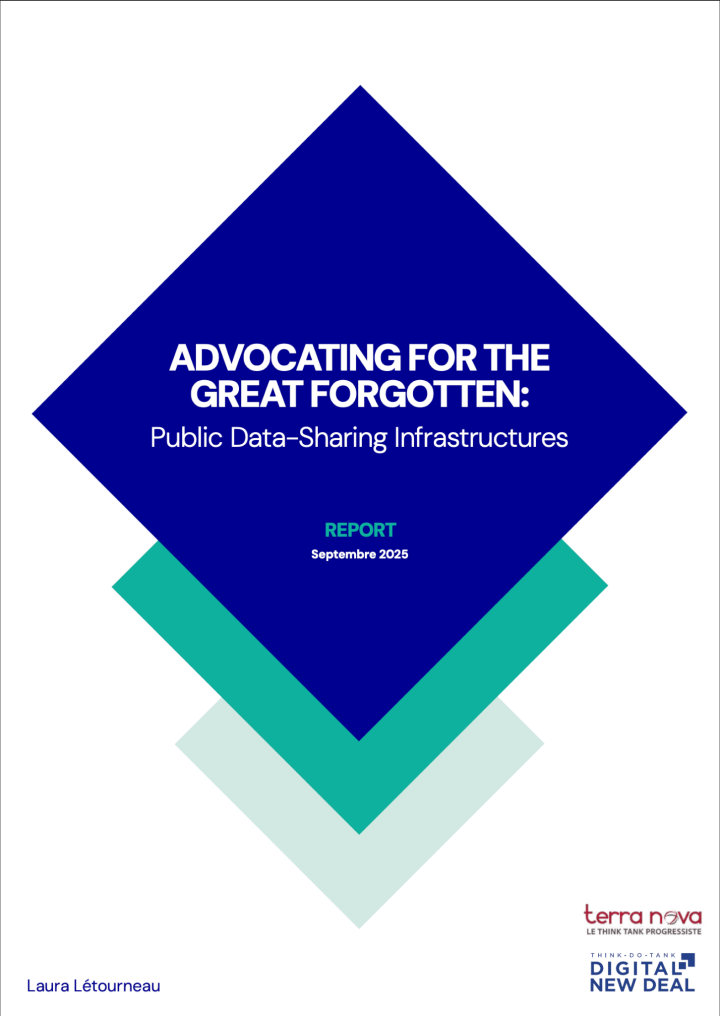This collaborative report, coordinated by Laura Létourneau and published by the two think tanks Digital New Deal and Terra Nova, is both a call to action and the first draft of a practical guide for deploying public infrastructures for data sharing — essential for the effectiveness of public policies, particularly the ecological transition and the country’s economic competitiveness.
« Urbanizing Digital Infrastructures for Collective Resilience»
Accelerating the secure circulation of data to address the challenges of our century
Public digital infrastructures for data sharing are a fundamental pillar for access to healthcare, the management of natural hazards and health crises, for accelerating economic transitions, and more broadly for the successful implementation of all public policies that require close collaboration between public, private, and/or non-profit actors.
Although the management of the Covid crisis highlighted the proportionally much stronger role of data sharing compared to AI — and even though inspection reports frequently point out failures in data sharing as a brake on public policies — these infrastructures still suffer from a lack of political support and insufficient resources.
Thinking of digital infrastructures in terms of urban planning
Just as in a city where houses are not built by public authorities but must comply with zoning codes and connect to sewage, water, and electricity networks, digital technology too must benefit from public infrastructures that organize a smooth and ethical exchange of data (avoiding a sort of slum where each one manages their own waste and lays their own power lines).
Providing concrete solutions to complex problems
The report highlights seven concrete examples of infrastructures, from which a practical, collective, and ambitious field guide has been drawn for their proper deployment. These include platforms such as Mon espace santé, the French citizens’ health record system that collects health data to empower each individual in managing their own health; Agdatahub, which facilitates data exchange in the agricultural sector to promote sustainable practices; or EONA-X, which pursues the same ambition for the mobility and tourism sector.
These initiatives bring major direct and indirect benefits to the effectiveness of public authorities, to the environmental and economic efficiency of companies, and to the strengthening of French and European digital sovereignty.
Aiming for transversal political governance
As with any systemic issue, data-sharing infrastructures raise complex governance questions. The report underlines the central role of public agents, as well as private and non-profit actors, in the success of this digital transformation. It also stresses the need for a shared interministerial vision, steered by the Prime Minister and supported by a DINUM/DGE duo at the national, European, and international levels — and for a collective, humanistic, and determined implementation.
Laura Létourneau
Engineer in Chief (Mines), she co-led the Ministerial Delegation for Digital Health for more than three years. The goal was to use digital technology to empower citizens, streamline coordination among healthcare professionals, and foster therapeutic and organizational innovations, all within an ethical framework that guaranteed medical confidentiality.
In 2022, she was appointed by the Prime Minister to build on this experience in support of the ecological transition at the General Secretariat for Ecological Planning (SGPE).
In 2017, together with Clément Bertholet, she co-authored the book Ubérisons l’État ! Avant que d’autres ne s’en chargent (“Let’s Uberize the State! Before Others Do It”), which advocated for the transformation of public services according to the collaborative “platform state” model.
